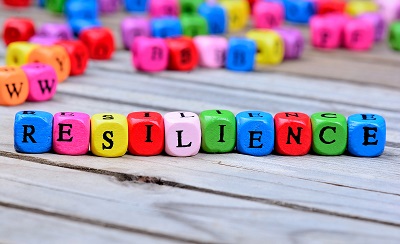 As the pandemic continues, we are all beginning to feel fatigue in varying degrees.
As the pandemic continues, we are all beginning to feel fatigue in varying degrees.
For some, we have moved into burnout: too much, too little, and/or complete overwhelm.
You may be asking, “is there anything that will help get me through this?” Yes, there is. Give yourself the gift of time and take a moment to learn about resilience and how you can actually thrive in challenging times. Resilience is the most beautiful 10-letter word you’ll ever know.
“It is not strongest of the species that survive, not the most intelligent but the one most responsive to change. Resilience is about our ability to adapt to change. In simpler terms it is the bounce back that we all have after a problem or challenging situation.” ~ Charles Darwin
Resilience can move you from…
- surviving: being stressed, reacting in unhealthy ways, denying or ignoring stressors, doing what you have always done, focusing on weakness, resisting or feeling unable to change, and waiting for a crisis to find help.
- thriving: recognizing your stress reaction, choosing healthier responses, recognizing your stressors, examining options and making good decisions, identifying and using your strengths, committing to growth and learning, and ensuring that you are aware of resources.
Growing and nurturing your resiliency muscle in these challenging times is possible. Keys to developing this muscle include:
- Learning something new. Step out of your comfort zone and create new pathways in your brain. This creates opportunities for failure and practice managing disappointment. Learn to develop comfort with the uncomfortable.
- Positive self-talk equals positive emotion. Practice reacting positively to whatever setback you face. Focus on yourself and what you can control. Try to keep the situation in perspective. Remember that while this is tough, you will get through it.
- Follow Vanessa King’s 10 Keys for Happier Living, entitled GREAT DREAM:
G – Giving: Do things for others. “Be kind wherever possible. It is always possible.” Dalai Lama
R – Relating: Connect with people. “For happiness, remember … other people matter.” Dr. C. Peterson
E – Exercising: Take care of your body. “All people in bad mood should go for a walk, and if it doesn’t improve, walk again.” Hippocrates
A – Awareness: Live life mindfully. Paying attention in a particular way: on purpose, in the present moment, and non-judgmentally.” Jon Kabat-Zinn
T – Trying Out: Keep learning new things. “Do one thing everyday that scares you.” Eleanor Roosevelt
D – Direction: Have goals to look forward to. “Goals give us direction. And it’s not just achieving them that’s important for happiness –but choosing, planning and working toward them too.” Vanessa King
R – Resilience: Find ways to bounce back. “Fall down 7 times, get up 8.” Japanese proverb
E – Emotions: Look for what’s good. “Gratitude makes sense of the past, brings peace for today, and creates a vision for tomorrow.” Melody Beattie
A – Acceptance: Be comfortable with who you are. “Having compassion for yourself means that you honor and accept your humanness.” Kristen Neff
M – Meaning: Be part of something bigger. “We have a choice to use the gift of our lives to make a difference. It is up to us to decide what kind of difference we’re going to make.” Dr. Jane Goodall
If you are having a problem with bounce back and would like to learn more about resiliency and how it can help you, please reach out to me, Annette Poechman, Registered Psychotherapist. Together we can build the resiliency needed to manage this stressful moment in time. Listening. Guiding. Caring.






